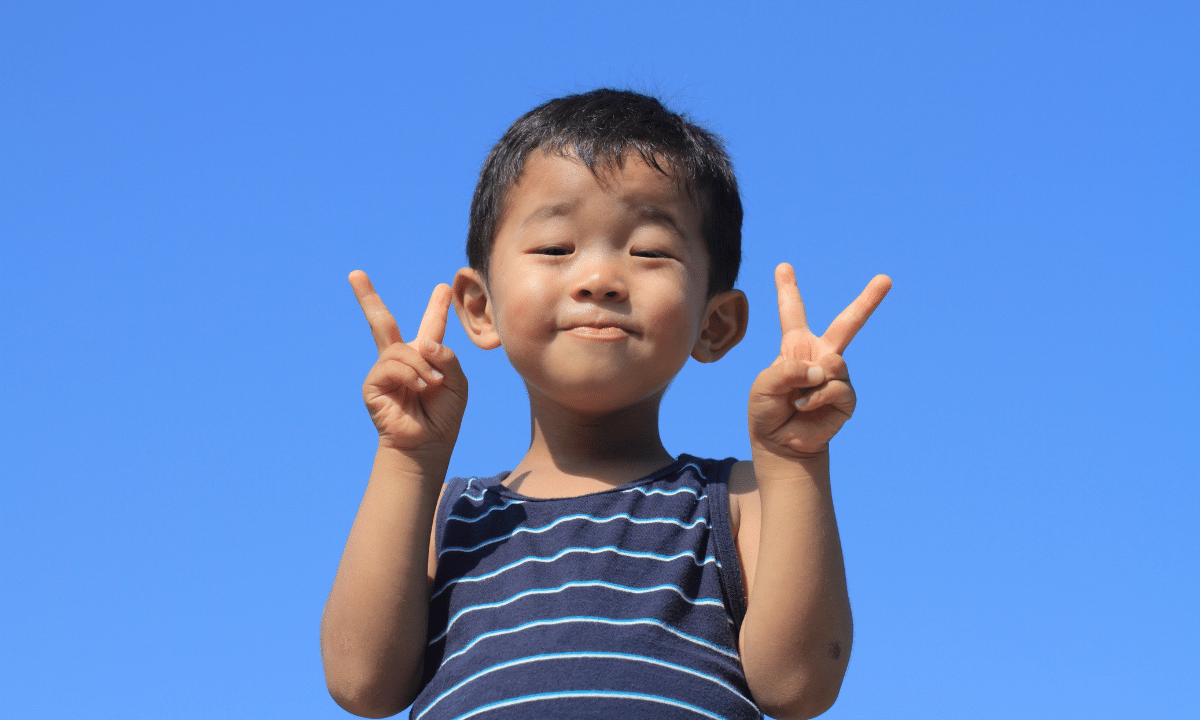Need a name that works for any child? Parents often struggle with traditional naming options that box children into strict gender roles before they even take their first steps.
Good news! Japanese offers a treasure of gender-neutral names with beautiful meanings. These names celebrate qualities like strength, wisdom, and harmony without limiting a child to gender expectations.
This collection of Japanese gender-neutral names provides options that honor Japanese cultural traditions while giving children the freedom to define themselves.
From nature-inspired choices to names celebrating inner qualities, these options offer the perfect balance of meaning and flexibility for any child.
Why Choose a Gender Neutral Name in Japanese?
Many parents now look for gender-neutral names for their children. Japanese offers many great options for this.
Gender-neutral names give children freedom to be themselves. These names don’t push kids into strict boy or girl boxes as they grow up.
Japanese names often focus on beautiful ideas that work for anyone. Names might mean “peace,” “bright,” or “honest” – qualities all people can have.
Having a name that works for any gender can make life easier if someone feels they don’t fit typical gender roles. It gives them one less thing to worry about.
Japanese culture has many symbols and words that praise good traits in all people. This makes the language perfect for finding names that celebrate a child for who they are, not just for being a boy or girl.
For parents who love Japanese culture, these names offer a meaningful choice that will grow with their child throughout life!
Popular Japanese Gender-Neutral Names

These names often carry meanings that emphasize purity, strength, or grace, reflecting the cultural value of balance and harmony in Japanese society.
1. Akira – 章
- Meaning: Bright, clear, intelligent.
- Cultural Significance: Commonly used for both genders, symbolizing clarity and brightness.
2. Aoi – 葵
- Meaning: Hollyhock, blue.
- Cultural Significance: Often used for both genders, represents nature and tranquility.
3. Aoki – 青木
- Meaning: Blue tree, young tree.
- Cultural Significance: A common surname, symbolizing growth and natural beauty.
4. Amane – 天音
- Meaning: Heavenly sound.
- Cultural Significance: A poetic, unisex name symbolizing grace and purity.
5. Chiaki – 千秋
- Meaning: Thousand autumns.
- Cultural Significance: Represents longevity, often used for both genders.
6. Chiharu – 千春
- Meaning: Thousand springs.
- Cultural Significance: Symbolizing the renewal of life, often associated with growth and vitality.
7. Chitose – 千歳
- Meaning: Thousand years.
- Cultural Significance: Represents eternal life, frequently used to express longevity.
8. Enkai – 円海
- Meaning: Circle ocean.
- Cultural Significance: Rare name, symbolizing completeness and the vastness of the ocean.
9. Fumika – ふみか
- Meaning: Beautiful writing, wisdom.
- Cultural Significance: Symbolizes intelligence and beauty, often used for females.
10. Harue – 晴恵
- Meaning: Clear weather, blessing.
- Cultural Significance: A name symbolizing a fresh start and positivity.
11. Hiromi – 広美
- Meaning: Wide beauty.
- Cultural Significance: Represents expansive beauty, commonly used for both genders.
12. Hisashi – 久志
- Meaning: Long-lasting, eternal.
- Cultural Significance: Symbolizes strength and perseverance.
13. Jin – 仁
- Meaning: Benevolence, compassion.
- Cultural Significance: Associated with kindness and empathy.
14. Juno – ジュノ
- Meaning: Name of the Roman goddess of marriage.
- Cultural Significance: Represents protection, fertility, and marriage.
15. Kaoru – 薫
- Meaning: Fragrance.
- Cultural Significance: Symbolizing elegance and refinement.
16. Kana – かな
- Meaning: Power, flower.
- Cultural Significance: Often used to symbolize beauty and strength.
17. Katana – 刀
- Meaning: Sword.
- Cultural Significance: Symbolizes strength, honor, and the tradition of the samurai.
18. Maemi – 真恵
- Meaning: Truth, blessing.
- Cultural Significance: Represents sincerity and goodness.
19. Michi – 道
- Meaning: Way, path.
- Cultural Significance: Symbolizes the journey of life, often associated with personal growth.
20. Ryo – 涼
- Meaning: Cool, refreshing.
- Cultural Significance: Often used for both genders, symbolizing calmness and serenity.
21. Seiko – 清子
- Meaning: Pure child.
- Cultural Significance: Represents innocence and purity.
22. Shinobu – 忍
- Meaning: Endurance, patience.
- Cultural Significance: Frequently associated with ninjas, symbolizes resilience and strength.
23. Shun – 駿
- Meaning: Handsome, talented.
- Cultural Significance: Represents strength and grace, commonly used for males.
24. Tomi – 富
- Meaning: Wealth, fortune.
- Cultural Significance: Symbolizes prosperity and success.
25. Tsubasa – 翼
- Meaning: Wings.
- Cultural Significance: Represents freedom, growth, and a sense of soaring.
26. Zen – 善
- Meaning: Goodness, virtue.
- Cultural Significance: Associated with Zen Buddhism, symbolizing peace and enlightenment.
27. Izumi – 泉
- Meaning: Spring, fountain.
- Cultural Significance: Represents purity and life-giving water.
28. Hachi – 八
- Meaning: Eight.
- Cultural Significance: The number eight is considered very lucky in Japanese culture.
29. Ichigo – 一五
- Meaning: One and five; also strawberry.
- Cultural Significance: Often associated with the fruit or the number combination.
30. Itsuki – 樹
- Meaning: Tree.
- Cultural Significance: Symbolizes strength, endurance, and the beauty of nature.
31. Jun – 潤
- Meaning: Moisture, gentleness.
- Cultural Significance: Often associated with nurturing and calmness.
32. Kairi – 海里
- Meaning: Sea village.
- Cultural Significance: Symbolizes the connection between humans and the ocean.
33. Kaede – 楓
- Meaning: Maple tree.
- Cultural Significance: Represents beauty, particularly in autumn.
34. Kin – 金
- Meaning: Gold.
- Cultural Significance: Symbolizes wealth, purity, and value.
35. Masa – 正
- Meaning: Correct, righteous.
- Cultural Significance: Represents moral integrity.
36. Mayumi – 真由美
- Meaning: Truth and beauty.
- Cultural Significance: Symbolizes elegance and authenticity.
37. Minato – 港
- Meaning: Harbor.
- Cultural Significance: Represents safety, a place of refuge.
38. Ren – 蓮
- Meaning: Lotus.
- Cultural Significance: Represents purity, enlightenment, and beauty.
39. Rin – 凛
- Meaning: Dignity, cold.
- Cultural Significance: Symbolizes strong character and composure.
40. Haruka – 遥
- Meaning: Distant, faraway.
- Cultural Significance: Symbolizes ambition and the vastness of the future.
41. Mako – 真琴
- Meaning: Truth, harmony.
- Cultural Significance: Often used to represent sincerity and balance.
42. Mizuki – 瑞希
- Meaning: Auspicious hope.
- Cultural Significance: Symbolizes good fortune and a bright future.
43. Riku – 陸
- Meaning: Land.
- Cultural Significance: Represents stability and strength.
44. Kiyoshi – 清志
- Meaning: Pure, righteous.
- Cultural Significance: Represents purity and moral clarity.
45. Kohaku – 琥珀
- Meaning: Amber.
- Cultural Significance: Symbolizes warmth and light.
46. Kosuke – 康介
- Meaning: Health, help.
- Cultural Significance: Represents good health and support.
47. Kozue – 梢
- Meaning: Branches of a tree.
- Cultural Significance: Symbolizes growth and connection.
48. Kumi – 久美
- Meaning: Long-lasting beauty.
- Cultural Significance: Represents timeless beauty.
49. Kyo – 京
- Meaning: Capital.
- Cultural Significance: Often associated with Kyoto, symbolizing tradition.
50. Maro – 丸
- Meaning: Circle.
- Cultural Significance: Symbolizes completeness and harmony.
51. Minori – 実り
- Meaning: Harvest, fruition.
- Cultural Significance: Symbolizes the result of hard work and prosperity.
52. Sora – 空
- Meaning: Sky.
- Cultural Significance: Represents freedom, vastness, and endless possibilities.
53. Yuuki – 優希
- Meaning: Gentle hope.
- Cultural Significance: Represents kindness and positive aspirations.
54. Nao – 直
- Meaning: Honest, direct.
- Cultural Significance: Represents sincerity and straightforwardness.
55. Kazumi – 一美
- Meaning: One beauty.
- Cultural Significance: Represents uniqueness and elegance.
56. Aki – 明
- Meaning: Bright, autumn.
- Cultural Significance: Represents both the beauty of autumn and clarity.
57. Chiyo – 千代
- Meaning: Thousand generations.
- Cultural Significance: Symbolizes longevity and enduring legacy.
58. Emiko – 恵美子
- Meaning: Blessed, beautiful child.
- Cultural Significance: Represents happiness and a blessed life.
59. Fumiko – 文子
- Meaning: Child of literature.
- Cultural Significance: Symbolizes wisdom, knowledge, and culture.
60. Hana – 花
- Meaning: Flower.
- Cultural Significance: Represents beauty, grace, and nature.
61. Harumi – 春美
- Meaning: Spring beauty.
- Cultural Significance: Represents renewal, freshness, and vitality.
62. Haruna – 春菜
- Meaning: Spring vegetables.
- Cultural Significance: Symbolizes the beauty of nature and growth.
63. Hikari – 光
- Meaning: Light.
- Cultural Significance: Represents hope, enlightenment, and a bright future.
64. Hinata – 日向
- Meaning: Sunflower, sunny place.
- Cultural Significance: Represents warmth, optimism, and the sun.
65. Hoshiko – 星子
- Meaning: Star child.
- Cultural Significance: Represents brightness, wonder, and the beauty of stars.
66. Kayo – 佳代
- Meaning: Beautiful generation.
- Cultural Significance: Symbolizes beauty and a prosperous future.
67. Kimi – 君
- Meaning: Noble, superior.
- Cultural Significance: Often used to convey respect and nobility.
68. Kiyoko – 清子
- Meaning: Pure child.
- Cultural Significance: Symbolizes purity and innocence.
69. Kiyomi – 清美
- Meaning: Pure beauty.
- Cultural Significance: Represents grace, elegance, and moral clarity.
70. Kohana – 小花
- Meaning: Small flower.
- Cultural Significance: Symbolizes gentleness, delicacy, and charm.
71. Masumi – 真澄
- Meaning: True clarity.
- Cultural Significance: Represents purity, clarity, and sincerity.
72. Mika – 美香
- Meaning: Beautiful fragrance.
- Cultural Significance: Symbolizes grace, beauty, and elegance.
73. Miyu – 美優
- Meaning: Beautiful gentleness.
- Cultural Significance: Represents kindness, grace, and sophistication.
74. Miyuki – 美雪
- Meaning: Beautiful snow.
- Cultural Significance: Symbolizes purity, beauty, and tranquility.
75. Nanami – 七海
- Meaning: Seven seas.
- Cultural Significance: Represents vastness, adventure, and exploration.
76. Natsumi – 夏美
- Meaning: Summer beauty.
- Cultural Significance: Represents warmth, light, and the beauty of summer.
77. Nozomi – 希美
- Meaning: Hope, beauty.
- Cultural Significance: Symbolizes aspirations, dreams, and a bright future.
78. Reika – 麗華
- Meaning: Gorgeous flower.
- Cultural Significance: Represents beauty, grace, and refinement.
79. Reiko – 玲子
- Meaning: Lovely child.
- Cultural Significance: Symbolizes elegance and grace.
80. Rika – 里香
- Meaning: Village fragrance.
- Cultural Significance: Represents simplicity, nature, and tranquility.
81. Rina – 理奈
- Meaning: Reason, grace.
- Cultural Significance: Symbolizes wisdom and charm.
82. Ryouko – 良子
- Meaning: Good child.
- Cultural Significance: Represents virtue and goodness.
83. Sachiko – 幸子
- Meaning: Happy child.
- Cultural Significance: Symbolizes happiness and good fortune.
84. Sakura – 桜
- Meaning: Cherry blossom.
- Cultural Significance: A symbol of beauty, renewal, and the transient nature of life.
85. Sayaka – さやか
- Meaning: Clear, fresh.
- Cultural Significance: Represents clarity, purity, and freshness.
86. Sayuri – 小百合
- Meaning: Little lily.
- Cultural Significance: Symbolizes elegance, beauty, and grace.
87. Shiori – 詩織
- Meaning: Poetry, weaving.
- Cultural Significance: Represents artistry, creativity, and elegance.
88. Shizuka – 静香
- Meaning: Quiet, calm.
- Cultural Significance: Represents peace, tranquility, and serenity.
89. Tomoyo – 智世
- Meaning: Wisdom, world.
- Cultural Significance: Represents intelligence and the wisdom of the world.
90. Tsubaki – 椿
- Meaning: Camellia.
- Cultural Significance: A symbol of beauty, elegance, and simplicity.
91. Yoshiko – 良子
- Meaning: Good child.
- Cultural Significance: Symbolizes virtue, goodness, and morality.
92. Yoshimi – 良美
- Meaning: Good beauty.
- Cultural Significance: Represents kindness.
93. Yuki – 雪
- Meaning: Snow.
- Cultural Significance: Represents purity, peace, and calm.
94. Yuna – 優奈
- Meaning: Gentle, calm.
- Cultural Significance: Symbolizes kindness and tranquility.
95. Yuri – 百合
- Meaning: Lily.
- Cultural Significance: Represents purity, beauty, and grace.
96. Yuji – 裕司
- Meaning: Abundant, guide.
- Cultural Significance: Symbolizes prosperity, leadership, and guidance.
97. Yuuto – 優斗
- Meaning: Gentle, Big Dipper.
- Cultural Significance: Represents kindness and greatness.
98. Katsuo – 勝男
- Meaning: Victory, man.
- Cultural Significance: Symbolizes strength, victory, and success.
99. Natsuki – 夏樹
- Meaning: Summer tree.
- Cultural Significance: Represents strength and vitality, particularly during the summer.
100. Akiyo – 秋代
- Meaning: Autumn generation.
- Cultural Significance: Symbolizes the beauty and richness of autumn.
101. Asahi – 朝日
- Meaning: Morning sun.
- Cultural Significance: Represents hope, renewal, and the beginning of a new day.
102. Ayumu – 歩夢
- Meaning: Walk, dream.
- Cultural Significance: Symbolizes progress and pursuing one’s dreams.
103. Chikage – 千影
- Meaning: Thousand shadows.
- Cultural Significance: Represents mystery and depth.
104. Eiji – 永治
- Meaning: Eternal rule.
- Cultural Significance: Symbolizes longevity and authority.
105. Fuyu – 冬
- Meaning: Winter.
- Cultural Significance: Represents resilience, beauty in stillness, and the cold season.
106. Hatsu – 初
- Meaning: First, beginning.
- Cultural Significance: Represents new beginnings and a fresh start.
107. Hibiki – 響
- Meaning: Sound, echo.
- Cultural Significance: Symbolizes resonance, impact, and deep meaning.
108. Hikaru – 光
- Meaning: Light.
- Cultural Significance: Represents clarity, hope, and positivity.
109. Hina – 陽菜
- Meaning: Sun, vegetables.
- Cultural Significance: Represents warmth, light, and growth.
110. Hoshimi – 星美
- Meaning: Star beauty.
- Cultural Significance: Symbolizes elegance, the beauty of the stars, and inspiration.
111. Ibuki – 伊吹
- Meaning: Breath, wind.
- Cultural Significance: Represents life force, nature, and energy.
112. Iori – 伊織
- Meaning: Weaving, fabric.
- Cultural Significance: Symbolizes connection, unity, and the fabric of life.
113. Isana – いさな
- Meaning: Sacred.
- Cultural Significance: Represents purity and reverence.
114. Izanami – イザナミ
- Meaning: The goddess of creation and death.
- Cultural Significance: Represents both creation and transformation, linked with Japanese mythology.
115. Juri – 樹里
- Meaning: Tree, village.
- Cultural Significance: Symbolizes roots, growth, and connection to the earth.
116. Kaho – 香帆
- Meaning: Fragrance, sail.
- Cultural Significance: Represents beauty, freshness, and the freedom of sailing.
117. Kairu – 海流
- Meaning: Ocean current.
- Cultural Significance: Symbolizes movement, fluidity, and the flow of life.
118. Kaito – 海斗
- Meaning: Ocean, Big Dipper.
- Cultural Significance: Represents vastness, guidance, and the mysteries of the sea.
119. Kaname – 要
- Meaning: Essential, key.
- Cultural Significance: Represents importance and centrality in life.
120. Kanon – 花音
- Meaning: Flower sound.
- Cultural Significance: Symbolizes the harmony of nature and beauty.
121. Kanna – 寛奈
- Meaning: Tolerant, harmonious.
- Cultural Significance: Represents grace and an accommodating spirit.
122. Karin – 佳琳
- Meaning: Beautiful jade.
- Cultural Significance: Symbolizes elegance, beauty, and preciousness.
123. Kasumi – 霞
- Meaning: Mist.
- Cultural Significance: Represents mystery, subtlety, and the ephemeral nature of life.
124. Katsu – 勝
- Meaning: Victory.
- Cultural Significance: Represents triumph and strength.
125. Kazue – 一恵
- Meaning: One blessing.
- Cultural Significance: Symbolizes a single, great blessing or grace.
126. Kazuki – 和希
- Meaning: Harmony, hope.
- Cultural Significance: Represents peace, serenity, and aspirations for the future.
127. Kazuma – 和真
- Meaning: Harmony, truth.
- Cultural Significance: Symbolizes balance, honesty, and integrity.
Other Unique Japanese Gender Neutral Names for Your Baby

These names offer versatility and beauty, often reflecting nature, virtues, or positive traits.
These names provide a connection to Japanese cultural values like balance, purity, and harmony, making them a meaningful choice for any child.
128. Keiji – 啓二
- Meaning: Enlightenment, second.
- Cultural Significance: Represents clarity, wisdom, and new beginnings.
129. Kei – 慧
- Meaning: Wisdom.
- Cultural Significance: Represents intelligence, insight, and moral understanding.
130. Keina – 恵奈
- Meaning: Blessed, summer.
- Cultural Significance: Symbolizes warmth, growth, and happiness.
131. Kenta – 健太
- Meaning: Healthy, big.
- Cultural Significance: Represents strength, health, and vitality.
132. Kiku – 菊
- Meaning: Chrysanthemum.
- Cultural Significance: A symbol of longevity, nobility, and Japan itself.
133. Kimiya – 君也
- Meaning: Noble, also.
- Cultural Significance: Represents nobility, status, and respect.
134. Kinu – 絹
- Meaning: Silk.
- Cultural Significance: Symbolizes elegance, smoothness, and luxury.
135. Kirara – きらら
- Meaning: Sparkle, twinkle.
- Cultural Significance: Represents brightness, elegance, and a lively spirit.
136. Kishi – 岸
- Meaning: Shore, bank.
- Cultural Significance: Represents stability and being grounded.
137. Kiyo – 清
- Meaning: Pure.
- Cultural Significance: Symbolizes innocence, moral purity, and clarity.
138. Koharu – 小春
- Meaning: Little spring.
- Cultural Significance: Represents warmth and the gentle beauty of the early spring.
139. Kokoro – 心
- Meaning: Heart, spirit.
- Cultural Significance: Represents emotional depth, soul, and compassion.
140. Komugi – 小麦
- Meaning: Wheat.
- Cultural Significance: Symbolizes abundance, growth, and sustenance.
141. Konomi – 好美
- Meaning: Like, beauty.
- Cultural Significance: Represents beauty that is appreciated or loved.
142. Kotone – 琴音
- Meaning: Koto sound.
- Cultural Significance: Represents traditional Japanese music and beauty.
143. Kouta – 幸太
- Meaning: Happy, big.
- Cultural Significance: Symbolizes joy, prosperity, and strength.
144. Kunie – 邦恵
- Meaning: Country, blessing.
- Cultural Significance: Represents national pride and a sense of belonging.
145. Kyohei – 京平
- Meaning: Capital, peace.
- Cultural Significance: Symbolizes balance, harmony, and respect for tradition.
146. Kyoko – 京子
- Meaning: Capital, child.
- Cultural Significance: Represents tradition and respect for the central values of culture.
147. Madoka – 円
- Meaning: Circle.
- Cultural Significance: Represents completeness and eternity.
148. Mahiro – 真浩
- Meaning: True, vast.
- Cultural Significance: Symbolizes sincerity, vastness, and depth.
149. Maika – 舞花
- Meaning: Dance, flower.
- Cultural Significance: Represents beauty, grace, and artistic expression.
150. Maiko – 舞子
- Meaning: Dance child.
- Cultural Significance: Symbolizes beauty and artistry, often used for a traditional Japanese dancer.
151. Maki – 真紀
- Meaning: Truth, chronicle.
- Cultural Significance: Represents authenticity and the recording of significant moments.
152. Makoto – 誠
- Meaning: Sincerity.
- Cultural Significance: Symbolizes honesty, integrity, and dedication.
153. Mamoru – 守
- Meaning: Protector.
- Cultural Significance: Represents guardianship, safety, and strength.
154. Mana – 真菜
- Meaning: True, vegetables.
- Cultural Significance: Represents purity and natural growth.
155. Manami – 愛美
- Meaning: Love, beauty.
- Cultural Significance: Symbolizes affection, beauty, and kindness.
156. Mao – 真央
- Meaning: True, center.
- Cultural Significance: Represents balance, truth, and centrality.
157. Mari – 真理
- Meaning: Truth, logic.
- Cultural Significance: Represents wisdom, truth, and reasoning.
158. Marina – 真理奈
- Meaning: True, grace.
- Cultural Significance: Symbolizes truth and beauty with an air of elegance.
159. Maru – 丸
- Meaning: Circle.
- Cultural Significance: Represents completeness, harmony, and unity.
160. Masaki – 正樹
- Meaning: Righteous tree.
- Cultural Significance: Symbolizes strength, virtue, and natural beauty.
161. Masato – 正人
- Meaning: Righteous person.
- Cultural Significance: Represents moral integrity and righteousness.
162. Mayu – 真優
- Meaning: Truth, gentleness.
- Cultural Significance: Represents kindness, grace, and sincerity.
163. Mei – 芽衣
- Meaning: Sprout, clothing.
- Cultural Significance: Symbolizes new beginnings, growth, and beauty.
164. Meiko – 芽子
- Meaning: Bud, child.
- Cultural Significance: Represents new life, youth, and potential.
165. Miho – 美保
- Meaning: Beautiful, protection.
- Cultural Significance: Represents beauty and care, often associated with protection.
166. Miki – 美紀
- Meaning: Beautiful chronicle.
- Cultural Significance: Symbolizes beauty and the recording of important events.
167. Miku – 美空
- Meaning: Beautiful sky.
- Cultural Significance: Represents freedom, beauty, and the vastness of the world.
168. Mina – 美奈
- Meaning: Beauty, graceful.
- Cultural Significance: Symbolizes elegance, beauty, and charm.
169. Minami – 南
- Meaning: South.
- Cultural Significance: Represents warmth, direction, and growth.
170. Mio – 美緒
- Meaning: Beautiful, thread.
- Cultural Significance: Symbolizes beauty and the connection between things.
171. Mirai – 未来
- Meaning: Future.
- Cultural Significance: Represents hope, potential, and the endless possibilities of tomorrow.
172. Misaki – 美咲
- Meaning: Beautiful bloom.
- Cultural Significance: Symbolizes the beauty of nature, youth, and vibrancy.
173. Mitsuki – 美月
- Meaning: Beautiful moon.
- Cultural Significance: Represents tranquility, elegance, and the beauty of the night.
174. Miyako – 都子
- Meaning: Capital, child.
- Cultural Significance: Symbolizes centrality, tradition, and importance.
175. Moe – 萌え
- Meaning: Sprout, budding.
- Cultural Significance: Represents new life, youth, and potential.
176. Momiji – 紅葉
- Meaning: Autumn leaves.
- Cultural Significance: Symbolizes the changing seasons, beauty, and transience.
177. Momoka – 桃花
- Meaning: Peach blossom.
- Cultural Significance: Represents beauty, femininity, and the transient nature of life.
178. Morio – 守男
- Meaning: Protector, man.
- Cultural Significance: Represents protection, strength, and courage.
179. Nagi – 凪
- Meaning: Calm, lull.
- Cultural Significance: Represents peace, stillness, and tranquility.
180. Nagisa – 渚
- Meaning: Seashore.
- Cultural Significance: Symbolizes natural beauty, serenity, and the connection between land and sea.
181. Nami – 波
- Meaning: Wave.
- Cultural Significance: Represents movement, flow, and the rhythm of life.
182. Namie – 奈美
- Meaning: Beautiful Nara.
- Cultural Significance: Represents beauty and the historical city of Nara.
183. Naoki – 直樹
- Meaning: Honest tree.
- Cultural Significance: Symbolizes truth, stability, and growth.
184. Nene – 寧々
- Meaning: Calm, peaceful.
- Cultural Significance: Represents tranquility, peace, and serenity.
185. Noa – 乃亜
- Meaning: My, Asia.
- Cultural Significance: A modern name, symbolizing a connection to the East or Asia.
186. Nobu – 信
- Meaning: Faith, trust.
- Cultural Significance: Represents loyalty, integrity, and reliability.
187. Nonoka – 野乃花
- Meaning: Field flower.
- Cultural Significance: Represents natural beauty, simplicity, and innocence.
188. Ran – 蘭
- Meaning: Orchid.
- Cultural Significance: Represents elegance, beauty, and exotic charm.
189. Rei – 礼
- Meaning: Courtesy, respect.
- Cultural Significance: Represents politeness, respect, and good manners.
190. Rena – 蓮
- Meaning: Lotus.
- Cultural Significance: Represents purity, enlightenment, and grace.
191. Riko – 莉子
- Meaning: Jasmine, child.
- Cultural Significance: Represents purity, grace, and innocence.
192. Rio – 莉緒
- Meaning: Jasmine thread.
- Cultural Significance: Symbolizes beauty and the delicate connection between life.
193. Rion – 理音
- Meaning: Reason, sound.
- Cultural Significance: Represents logic, wisdom, and communication.
194. Risa – 理沙
- Meaning: Reason, sand.
- Cultural Significance: Symbolizes wisdom, nature, and the beauty of simplicity.
195. Ritsu – 律
- Meaning: Law, rhythm.
- Cultural Significance: Represents order, structure, and harmony.
196. Rumi – 留美
- Meaning: Beautiful, stay.
- Cultural Significance: Symbolizes beauty and the desire to remain rooted.
197. Runa – 琉奈
- Meaning: Jewel, grace.
- Cultural Significance: Represents preciousness, beauty, and elegance.
198. Ruri – 瑠璃
- Meaning: Lapis lazuli.
- Cultural Significance: Represents deep beauty, wisdom, and royalty.
199. Ryuu – 竜
- Meaning: Dragon.
- Cultural Significance: Symbolizes power, strength, and mythical presence.
200. Sae – 紗江
- Meaning: Gauze, river.
- Cultural Significance: Represents delicacy and the flow of life.
201. Saki – 咲
- Meaning: Blossom.
- Cultural Significance: Symbolizes beauty, new beginnings, and the blooming of life.
202. Sakiko – 幸子
- Meaning: Happy child.
- Cultural Significance: Represents happiness, good fortune, and joy.
203. Sakurako – 桜子
- Meaning: Cherry blossom child.
- Cultural Significance: Symbolizes beauty, grace, and the fleeting nature of life.
204. Sana – 紗奈
- Meaning: Gauze, graceful.
- Cultural Significance: Represents delicacy, elegance, and purity.
205. Sango – 珊瑚
- Meaning: Coral.
- Cultural Significance: Represents beauty, richness, and the vibrancy of the ocean.
206. Satsuki – 皐月
- Meaning: May (the month).
- Cultural Significance: Represents the beauty of spring and renewal.
207. Seina – 聖奈
- Meaning: Sacred, graceful.
- Cultural Significance: Symbolizes purity, grace, and spiritual beauty.
208. Sena – 世奈
- Meaning: World, graceful.
- Cultural Significance: Represents strength, beauty, and a balanced nature.
209. Shiki – 四季
- Meaning: Four seasons.
- Cultural Significance: Represents the cycle of life, nature, and change.
210. Shion – 紫苑
- Meaning: Aster flower.
- Cultural Significance: Symbolizes love, beauty, and remembrance.
211. Shizuku – 雫
- Meaning: Drop (as in a water drop).
- Cultural Significance: Represents purity, fluidity, and delicacy.
212. Sorano – 空野
- Meaning: Sky field.
- Cultural Significance: Symbolizes vastness, freedom, and the beauty of nature.
213. Subaru – 昴
- Meaning: Pleiades (star cluster).
- Cultural Significance: Represents guidance, the stars, and cosmic beauty.
214. Suzu – 鈴
- Meaning: Bell.
- Cultural Significance: Represents clarity, harmony, and a peaceful sound.
215. Suzume – 雀
- Meaning: Sparrow.
- Cultural Significance: Symbolizes freedom, vitality, and small yet powerful beauty.
216. Taiga – 大河
- Meaning: Big river.
- Cultural Significance: Represents strength, flow, and the importance of natural elements.
217. Takara – 宝
- Meaning: Treasure.
- Cultural Significance: Symbolizes something precious, valuable, and cherished.
218. Takumi – 匠
- Meaning: Artisan, master.
- Cultural Significance: Represents skill, craftsmanship, and perfection.
219. Tamaki – 玉樹
- Meaning: Gem tree.
- Cultural Significance: Represents preciousness and the elegance of nature.
220. Tamiko – 民子
- Meaning: People, child.
- Cultural Significance: Symbolizes the connection to community and the collective good.
221. Tatsu – 龍
- Meaning: Dragon.
- Cultural Significance: Represents power, strength, and mysticism.
222. Toki – 時
- Meaning: Time.
- Cultural Significance: Symbolizes the passage of time, the importance of moments, and history.
223. Tomo – 友
- Meaning: Friend.
- Cultural Significance: Represents companionship, friendship, and loyalty.
224. Tomoka – 智香
- Meaning: Wisdom, fragrance.
- Cultural Significance: Represents intelligence, grace, and the elegance of knowledge.
225. Tomomi – 朋美
- Meaning: Friend, beauty.
- Cultural Significance: Symbolizes the beauty of companionship and meaningful relationships.
226. Tsukasa – 司
- Meaning: Director, manager.
- Cultural Significance: Represents authority, leadership, and the ability to guide others.
227. Tsukushi – 筑紫
- Meaning: Name of a region, often associated with strength.
- Cultural Significance: Symbolizes history, strength, and resilience.
228. Umi – 海
- Meaning: Sea.
- Cultural Significance: Represents vastness, mystery, and freedom.
229. Wakana – 和奏
- Meaning: Harmony, music.
- Cultural Significance: Represents peace, melody, and the beauty of music.
230. Yori – 頼
- Meaning: Trust.
- Cultural Significance: Symbolizes faith, reliance, and security.
231. Yua – 結愛
- Meaning: Tied love.
- Cultural Significance: Represents strong connections and love that binds people together.
232. Yuina – 結菜
- Meaning: Tied vegetables.
- Cultural Significance: Symbolizes harmony and the connection between life and nature.
233. Yuka – 由佳
- Meaning: Reason, excellent.
- Cultural Significance: Represents purpose and excellence in life.
234. Yukari – 由香
- Meaning: Reason, fragrance.
- Cultural Significance: Represents elegance, meaning, and beauty.
235. Yukiko – 雪子
- Meaning: Snow child.
- Cultural Significance: Symbolizes purity, calmness, and winter’s beauty.
236. Yuma – 優真
- Meaning: Gentle truth.
- Cultural Significance: Represents kindness, sincerity, and integrity.
237. Yumeko – 夢子
- Meaning: Dream child.
- Cultural Significance: Symbolizes dreams, aspirations, and hope for the future.
238. Yumika – 由美花
- Meaning: Reason, beautiful flower.
- Cultural Significance: Represents beauty, grace, and purpose.
239. Yura – 由良
- Meaning: Reason, good.
- Cultural Significance: Symbolizes harmony, goodness, and reason.
240. Yurika – 百合花
- Meaning: Lily flower.
- Cultural Significance: Represents purity, beauty, and elegance.
241. Yuuna – 優奈
- Meaning: Gentle, graceful.
- Cultural Significance: Represents softness, kindness, and poise.
242. Yuzuki – 由月
- Meaning: Reason, moon.
- Cultural Significance: Symbolizes wisdom, clarity, and the beauty of the moon.
243. Suzuka – 鈴鹿
- Meaning: Bell, deer.
- Cultural Significance: Represents harmony, peace, and nature’s elegance.
244. Bashira – 馬志良
- Meaning: Horse, good.
- Cultural Significance: Symbolizes strength, speed, and nobility.
245. Chiasa – 千朝
- Meaning: Thousand mornings.
- Cultural Significance: Represents hope, renewal, and new beginnings.
246. Dai – 大
- Meaning: Big, large.
- Cultural Significance: Symbolizes greatness, strength, and power.
247. Emica – 絵美香
- Meaning: Picture, beauty, fragrance.
- Cultural Significance: Represents beauty in all its forms, both visual and sensory.
248. Hayami – 隼海
- Meaning: Falcon, sea.
- Cultural Significance: Represents freedom, strength, and the vastness of nature.
249. Hino – 陽乃
- Meaning: Sun, field.
- Cultural Significance: Symbolizes warmth, vitality, and the power of nature.
250. Isamu – 勇
- Meaning: Courage.
- Cultural Significance: Represents bravery, strength, and resilience.
251. Kirari – きらり
- Meaning: Sparkling.
- Cultural Significance: Symbolizes brilliance, energy, and radiance.
252. Miu – 美優
- Meaning: Beautiful, gentleness.
- Cultural Significance: Represents beauty, grace, and refinement.
253. Mitsu – 光
- Meaning: Light.
- Cultural Significance: Represents hope, clarity, and the guiding power of light.
254. Reiki – 霊気
- Meaning: Spiritual energy.
- Cultural Significance: Symbolizes healing energy and the balance of body and spirit.
255. Arata – 新
- Meaning: New.
- Cultural Significance: Represents fresh beginnings, renewal, and change.
256. Asa – 朝
- Meaning: Morning.
- Cultural Significance: Represents a new day, optimism, and fresh starts.
257. Botan – 牡丹
- Meaning: Peony.
- Cultural Significance: Symbolizes wealth, prosperity, and good fortune.
258. Chibi – ちび
- Meaning: Small.
- Cultural Significance: Represents cuteness, innocence, and playfulness.
259. Chikafusa – 千家
- Meaning: Thousand households.
- Cultural Significance: Symbolizes community, legacy, and tradition.
260. Chimon – 千門
- Meaning: Thousand doors.
- Cultural Significance: Represents endless opportunities, choices, and gateways to new experiences.
261. Daigo – 大悟
- Meaning: Great wisdom.
- Cultural Significance: Represents enlightenment and deep understanding.
262. Daijiro – 大次郎
- Meaning: Great, second son.
- Cultural Significance: Symbolizes strength, responsibility, and leadership.
263. Danno – 壌
- Meaning: Soil.
- Cultural Significance: Represents fertility, nature, and the foundation of growth.
264. Danuja – ダヌジャ
- Meaning: Unknown.
- Cultural Significance: Rare and exotic name, often associated with distinct origins or cultures.
265. Enmei – 園明
- Meaning: Clear garden.
- Cultural Significance: Represents clarity and the peacefulness of nature.
266. Fuji – 富士
- Meaning: Wealth, Mt. Fuji.
- Cultural Significance: Represents strength, beauty, and the iconic Mount Fuji in Japan.
267. Genkei – 元気
- Meaning: Vitality.
- Cultural Significance: Symbolizes energy, life force, and enthusiasm.
268. Giichi – 義一
- Meaning: Righteousness, one.
- Cultural Significance: Represents integrity, justice, and a strong sense of moral character.
269. Goku – 悟空
- Meaning: Awakening to the void.
- Cultural Significance: Associated with the famous character from Dragon Ball, representing strength and enlightenment.
270. Goro – 五郎
- Meaning: Fifth son.
- Cultural Significance: Represents tradition, often used for the fifth-born son.
271. Gou – 剛
- Meaning: Strong.
- Cultural Significance: Represents strength, power, and durability.
272. Habiki – 響
- Meaning: Sound, echo.
- Cultural Significance: Symbolizes resonance, impact, and influence.
273. Hideki – 英樹
- Meaning: Outstanding tree.
- Cultural Significance: Represents excellence, growth, and leadership.
274. Hideo – 英雄
- Meaning: Hero.
- Cultural Significance: Represents bravery, courage, and leadership.
275. Hiroto – 浩人
- Meaning: Vast, person.
- Cultural Significance: Represents greatness, expansiveness, and a noble nature.
276. Ichiro – 一郎
- Meaning: First son.
- Cultural Significance: Represents tradition and the firstborn son, often viewed with importance.
277. Itachi – イタチ
- Meaning: Weasel.
- Cultural Significance: A name often associated with strength and wit, also popular in anime.
278. Jiro – 次郎
- Meaning: Second son.
- Cultural Significance: Represents a sense of responsibility, typically used for the second-born son.
279. Jomei – 浄明
- Meaning: Pure and bright.
- Cultural Significance: Represents purity, enlightenment, and clarity.
280. Jona – ジョナ
- Meaning: Unknown.
- Cultural Significance: A rare name, often used in international contexts.
281. Junichiro – 純一郎
- Meaning: Pure first son.
- Cultural Significance: Represents purity, honor, and a deep respect for tradition.
282. Junpei – 純平
- Meaning: Pure, peace.
- Cultural Significance: Symbolizes inner peace, clarity, and a calm nature.
283. Jurou – 十郎
- Meaning: Tenth son.
- Cultural Significance: Represents tradition and family heritage, often used for the tenth-born son.
284. Kai – 海
- Meaning: Sea.
- Cultural Significance: Symbolizes vastness, freedom, and a connection to nature.
285. Kane – 金
- Meaning: Gold.
- Cultural Significance: Represents wealth, value, and prosperity.
286. Kazuo – 和夫
- Meaning: Harmony, man.
- Cultural Significance: Symbolizes balance, peace, and a strong connection to family.
287. Kenji – 健二
- Meaning: Healthy, second.
- Cultural Significance: Represents health, vitality, and a sense of responsibility.
The Bottom Line
These names provide more than just labels – they’re starting points for a child’s identity journey. Each name carries positive meanings without gender limitations.
What’s next? Take time to research the meanings that resonate with your family values. Say potential names aloud to feel their sound and rhythm.


















